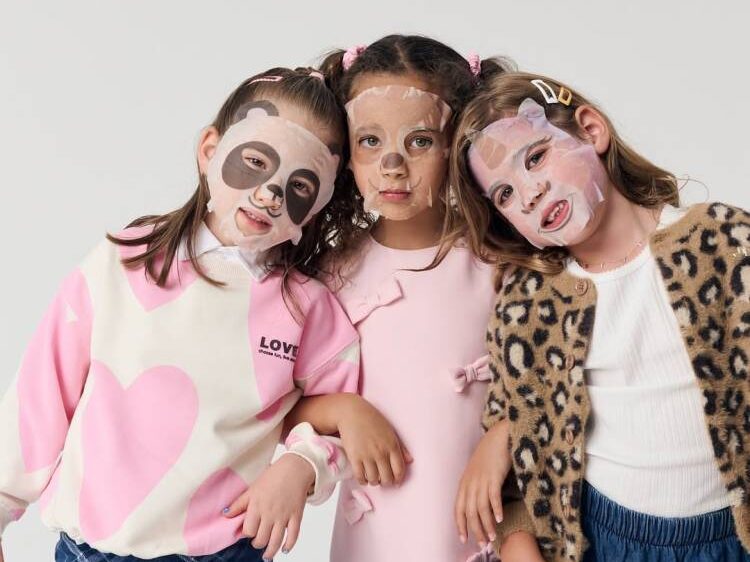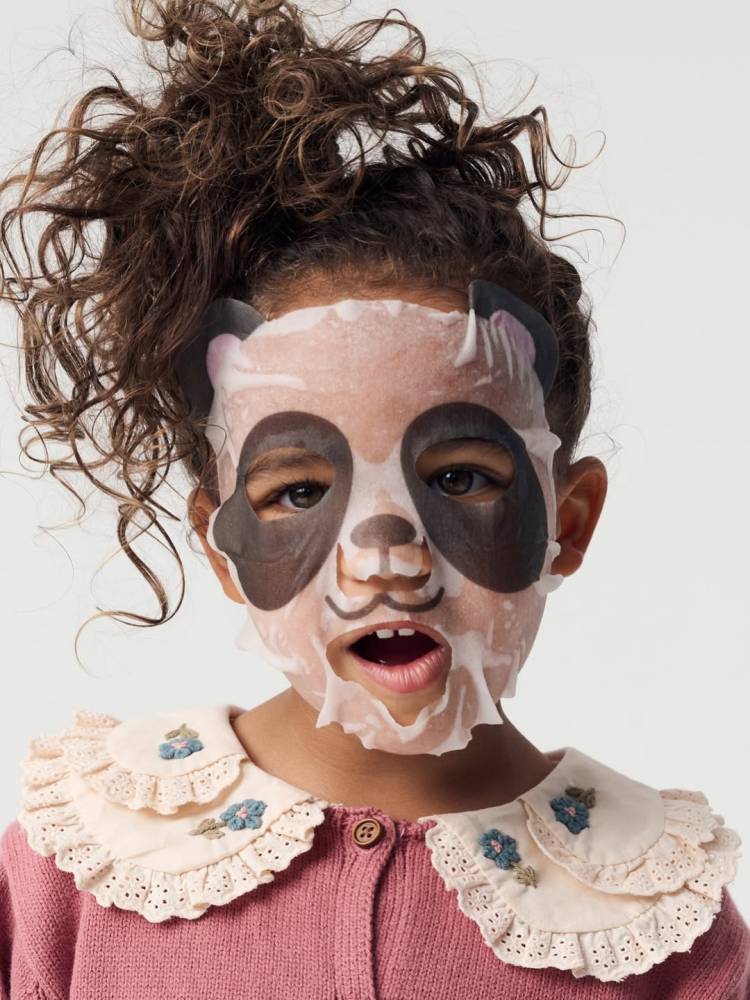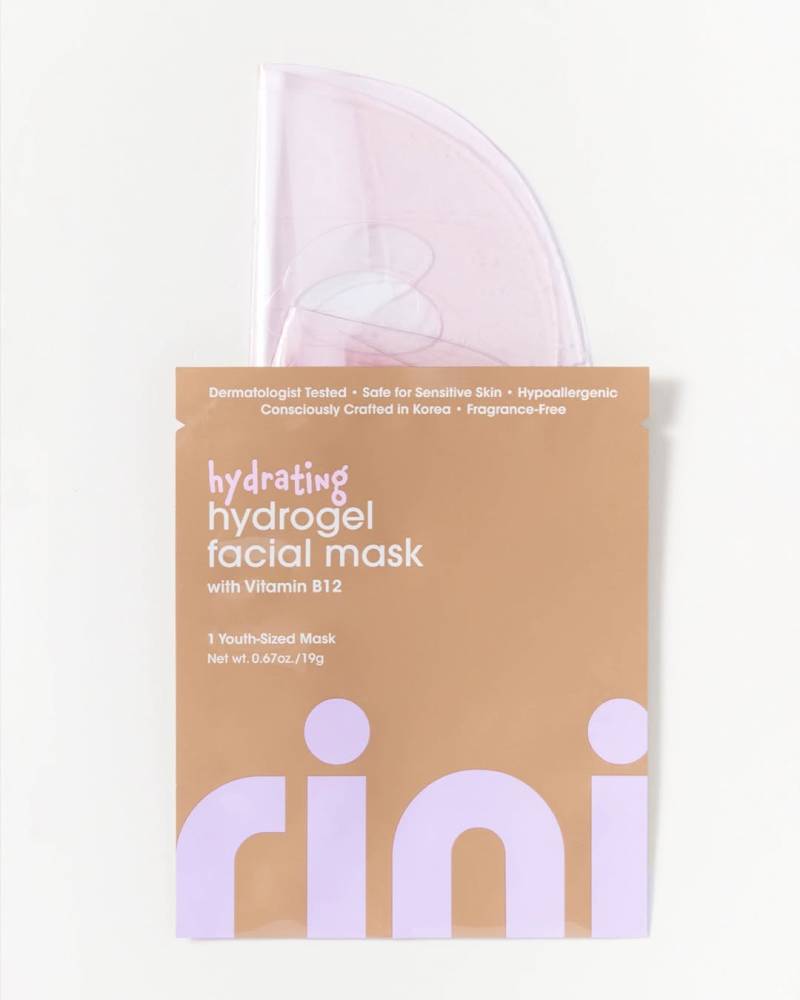When skincare reaches the playroom

What used to be a simple wash-and-go routine for kids is now evolving into mini “self-care rituals,” complete with sheet masks and serums. My nieces, like so many children, love to play pretend—swiping on invisible lipstick or copying their aunt’s hair care routine for fun. But as charming as imitation can be, some brands have learned to capitalize on that curiosity, pushing kid-friendly skincare into a full-on market trend that’s starting to feel a little too grown-up for comfort.
Skincare for toddlers
“Pretty Little Liars’” Shay Mitchell recently made waves with Rini, her new skincare line designed for children as young as three. The brand currently offers five products, starting at $5.99, including hydrogel masks or after-sun formulas, as well as “everyday” sheet masks in playful panda, unicorn, and puppy designs. Mitchell, along with co-founders Esther Song and Matte Babel, says the line is meant to introduce gentle skincare habits in a safe, age-appropriate way, drawing inspiration from K-beauty.
“Rini embodies the philosophy of Korean beauty, re-imagining children’s skincare and play through proven ingredients and thoughtful formulations,” the press release says. The brand worked with multiple pediatric chemists and laboratories in South Korea to develop its products, ensuring that each item is safe and gentle for young skin.
Rini’s masks feature hydrating and soothing ingredients like vitamin B12, aloe vera, chamomile, and tremella mushroom extract. They are free from parabens, alcohol, synthetic dyes, and other common irritants, and are vegan, cruelty-free, and non-comedogenic. According to Mitchell, the goal is not to create beauty pressure but to provide a fun, safe, and educational way for children to explore self-care.

Still, the launch has ignited a wave of online debate. Critics argue that even “safe” products may push beauty routines too early, potentially influencing beauty standards for children as young as three and turning playful curiosity into consumer-driven habits.
The launch also raises questions about the very concept of self-care for children. While Rini positions its products as fun, gentle, and safe ways for kids to explore self-care, people argue that children don’t need structured skincare routines at all—and that marketing these rituals risks normalizing beauty culture far too early.
TikTok users have voiced concerns that the line represents “next-level predatory capitalism,” prioritizing profit over childhood well-being.
On the other hand, not everyone sees it as problematic. Some point out that children’s interest in makeup and beauty has long existed—kids are often spotted exploring products at stores like Sephora. They argue that Rini offers a structured and safe way for kids to engage in playful self-care without the risks associated with using adult products.
Mind you, Rini is not the first brand to launch skincare products for children. Brands like Evereden and Glow Hub have already entered this space, offering gentle, kid-friendly formulations. What sets Rini apart, however, is its celebrity backing, and the fact that it is a brand built specifically around a full skincare line for children. That makes kids the direct target audience, which explains why the launch feels unsettling, even controversial, for some.

Skincare in a cultural lens
However, what we need to consider is that the brand also enters the conversation from a very different cultural lens. The brand explicitly states in its press release that it embodies the philosophy of Korean beauty. In Korea, skincare for children isn’t unusual or controversial—it’s seen as a normal extension of basic hygiene. Parents often apply lotion, sunscreen, or soothing gels to their kids, and gentle routines are woven into daily life without attaching any sense of beauty standards or pressure to appear a certain way. It’s simply care, comfort, and habit-building. In fact, it’s not unusual to see parents and children at bathhouses getting a complete scrub down, exposing kids early to the idea of taking care of their skin as part of regular hygiene rather than vanity.
When that philosophy arrives in the U.S., it meets a beauty culture that tends to associate products with corrective measures, beauty standards, or anti-aging goals. That’s partly why some interpret kids’ skincare as unnecessary. But within a Korean framework, early routines focus more on teaching kids to understand what their skin needs.
So in that sense, Rini’s existence does make sense. Of course, skincare for children isn’t necessary—and it was never about necessity to begin with. The real question is whether children who are curious about skincare can explore it safely and responsibly, using products actually meant for them. Kids today are more interested in beauty than ever. How could they not be? They’re growing up in a digital world filled with “Get Ready/Unready With Me” videos, viral products, and constant influencer content.
But, at the same time, we can’t ignore the capitalism behind it. Seven dollars for a sheet mask is steep, and the industry knows exactly what it’s doing. With Gen Alpha’s spending power projected to reach $5.5 trillion by 2029—and having already spent nearly $4.7 billion on beauty products in 2023—brands are racing to capture their attention early.
Thus, we have to accept that products like these are inevitably going to enter the market. What matters now is directing the conversation: positioning children’s skincare not as early beauty pressure, but as education—teaching kids about care, safety, and healthy skin habits rather than appearance.

















